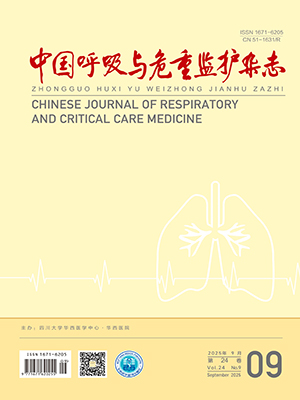Objective To investigate the effects of antithrombin-Ⅲ ( AT-Ⅲ) on the inflammatory reaction in oleic acid-induced acute lung injury ( ALI) rats. Methods Sixtymale Sprague-Dawley rats were randomly divided into five groups, ie. a normal control group, an ALI group, an AT-Ⅲ treatment group, an AT-Ⅲ +heparin treatment group, and a heparin treatment group ( n =12) . The ALI rats were induced by injecting oleic acid ( 0. 2 mL/kg) intravenously. The lung histology was scored by modified Smith
technique. The albumin permeability of pulmonary microvascular ( Palb) was measured by single nuclide tracer technique. The extravascular lung water ( EVLW) and wet/dry weight ratio ( W/D) of lung tissues were measured by gravity way. The activity of AT-Ⅲ in plasma was determined by the method of synthetic
chromogenic substrate. Tumor necrosis factor α( TNF-α) , interleukin 6 ( IL-6) and von Willebrand factor ( vWF) levels in serum were determined using commercial enzyme-linked immunosorbent assay kits. The expressions of lung tissue extacellular signal-regulated kinases ( ERK) -1 /2, P38 mitogen-activated protein
kinase ( MAPK) and c-jun N-terminal kinases ( JNK) were determined by Western blot. Results The Smith scores, EVLW, Palb , plasma level of vWF, lung tissue levels of phospho-ERK1 /2 and phospho-P38 MAPK expressions in the ALI group were all significantly higher than those in the normal control group ( P lt; 0.05) , while not significant differentwith other three treatment groups. There were not significant differences in the activity of AT-Ⅲ in plasma and phospho-JNK expression among all five groups. The serum levels of TNF-αand IL-6 in the ALI group were significantly higher than those in the normal control group and three treatment groups. Conclusions AT-Ⅲ downregulates the levels of downstreamcytokines TNF-αand IL-6,but can not inhibite the activation of ERK1 /2 and P38 MAPK, and can not relieve endothelial permeability.The study do not demonstrate the lung protective effect of AT-Ⅲ in oleic acid-induced acute lung injury.
Citation: SUN Huiming,SHI Yi,SONG Yong,GAO Wei,LI Pei,SUN Wenkui. Effects of Antithrombin-Ⅲ on Inflammatory Reaction and Pulmonary Protection in Oleic Acid-Induced Acute Lung Injury Rats. Chinese Journal of Respiratory and Critical Care Medicine, 2011, 10(2): 148-153. doi: Copy
Copyright © the editorial department of Chinese Journal of Respiratory and Critical Care Medicine of West China Medical Publisher. All rights reserved




